Eden Reforestation Projects
Eden Reforestation Projects (Eden) is a nonprofit organization that works in developing countries to rebuild natural landscapes destroyed by deforestation. Eden works directly with villages and communities suffering from extreme poverty resulting from the deforestation and destruction of the land that sustains them. The organization employs thousands of local villagers and provides them with the education and tools necessary to plant, grow, and protect to maturity, millions of trees each year. Eden plants over 3,000,000 additional trees a month and in 2018 reached over 200,000,000 trees planted. This model, developed by founder Steve Fitch, has proven to be very successful and resulted in poverty alleviation for thousands of people in Eden’s first 10 years of operation and beyond.
 | |
| Founded | 2004 |
|---|---|
| Type | Non-governmental organization |
| Focus | Reforestation and environmental stewardship |
| Location | |
Area served | Madagascar Ethiopia-paused Haiti Nepal Indonesia |
Key people | Steve Fitch (CEO & Founder) |
| Website | www |
History
Eden Reforestation Projects was conceptualized in the fall of 2004 following the invitation of Ethiopia’s Prime Minister, Hailemariam Desalegn, to take over an abandoned nursery and reforestation project. At the time, Hailemariam Desalegn was the President of the Southern People’s Region of Ethiopia and was struggling to keep the Southern People's Region reforestation program operational. Eden’s Founder and President, Steve Fitch, accepted the offer and seedling production commenced almost immediately. Within the first year of operation, over 200,000 trees were planted, turning the region's reforestation program into one of the most successful programs in the region's history. Since then, Eden Reforestation Projects has established nurseries and reforestation programs in Madagascar, Haiti, Ethiopia (paused in 2015), Nepal, and Indonesia, planting millions of trees every month, and lifting over 3,500 people out of extreme poverty through the utilization of the simple, yet effective Employ-to-Plant model. The organization is headquartered in Glendora, California and has offices/employees across all of their project locations.
Timeline
The timeline below shows Eden Reforestation Projects history from its beginnings in early 2000 to present day.
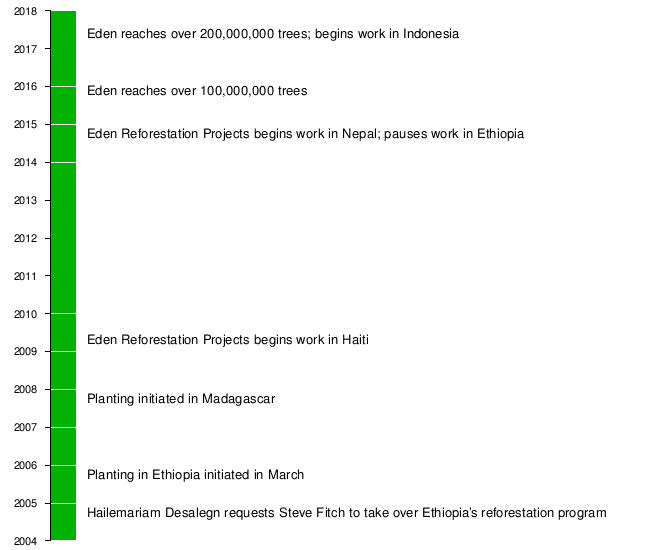
Methodology
Eden Reforestation Projects uses a unique Employ-to-Plant model in all of its in-country reforestation programs. The restoration process begins with prioritizing the needs of the local villagers. Combining poverty alleviation with environmental stewardship creates harmony between the villagers and the environment and Eden’s village employees have consistently "fallen in love" with their forests. This methodology is simple, but effective in cultivating working relationships while at the same time rejuvenating the soil and thus the natural environment. The consistent source of income provides families a way out of poverty and gives them the resources to send their children to school. Eden Reforestation Projects also helps educate the communities they work with regarding the importance of trees and maintaining healthy forests. The organization conducts training sessions throughout the year to educate community leaders. Educational materials and lectures are provided to the local community in an effort to educate the next generation and give them an appreciation for their natural environment. This holistic approach is utilized in each of the communities which Eden works.They have learned that life was negatively impacted by the destruction of the forests and quickly become committed to guarding and enjoying the benefits of the newly emerged forest that they planted themselves.

Deforestation
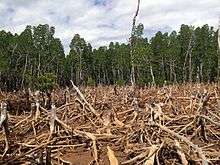
Deforestation is the removal of trees and forest cover from a naturally occurring forested or woody area. Deforestation is also commonly known as clearcutting or clearing. This is a significant issue because, over 31% of the earth is covered by forest growth, which makes it one of the most common land cover types.[1] However, of this 31% roughly 22%[2] remains of the old growth forests that used to cover much of the world. Without forests and forest covers there would be insufficient amounts of oxygen present to sustain human life or support the diversity of life that we are accustomed to today.[3] Forests also are an integral part of the carbon cycle and in turn help reduce the effects of global climate change, by reducing the amount of carbon dioxide in the atmosphere. Conversely, deforestation is a major contributor to climate change, especially tropical deforestation in regions like Madagascar.[4] Madagascar alone supports over 280,000 hectares of mangrove forests. However, the country has suffered from a net forest cover loss of 21% over the past ten years.[5]
International Impact
Ethiopia
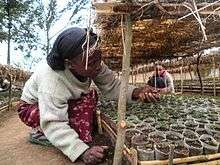
In 2005, Eden Reforestation Projects began working in Ethiopia. It was in this nation that Eden first began and introduced their "Employ-to-Plant" model. Most of Eden’s efforts were focused in the Great Rift Valley which suffers from extreme deforestation and poverty. Eden's work in Ethiopia began by a request by Hailemariam Desalegn, the Prime Minister of Ethiopia (2012-2018), to take over the country’s failing reforestation program. Between 2005 and 2015 nearly 16 million seedlings were grown, planted, and guarded to maturity at three reforestation sites. The project helped reforest millions of trees and lifted hundreds of families out of poverty, thus establishing the organization’s tagline, “Plant Trees | Save Lives”. As of 2015, the original reforestation sites were completed and Eden is currently looking for new, viable reforestation opportunities in Ethiopia.
Madagascar
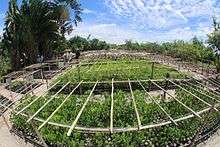
Eden Reforestation Projects began reforestation efforts in Madagascar in 2007 and planted over 178,000,000 trees in their first ten years. Madagascar contains 280,000 hectares of Mangrove forests, which represents 2% of the worlds total mangrove forests.[6] Severe deforestation, caused by a rapidly growing but extremely poor population, gives the Malagasy people few alternatives to making a living from the land. Eden Reforestation Projects is committed to transforming the economic plight of local Malagasy villagers who clear cut forests for agricultural or charcoal purposes. Current efforts in Madagascar are focused around eight Malagasy villages on the western side of the country and their adjacent forests. Eden also partners with Ankarafantsika National Park, Mahajanga University, and Antsanitia hotel resort with a private forest reserve. The vast majority of the trees planted in Madagascar are mangrove trees, which occur only in coastal estuary regions, but in 2012 Eden expanded their work to include dry deciduous forest species. The overwhelming majority of the tree species grown are endemic to Madagascar's western region and virtually all of the species grown are native, which is essential to the well-being of the larger ecosystem. Eden also participates in holistic community development, including a nursery training center, assisting with the construction of schools, building fresh water wells, and supplying basic medical services. Eden's current planting rate in Madagascar is over 25 million trees per annum. In 2017, the organization partnered with Ecosia to plant over seven million trees in Madagascar.[7]
Haiti
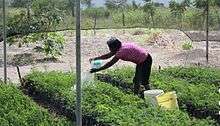
Haiti is recognized as the poorest country in the western hemisphere and has one of the world's highest rates of deforestation.[8] Since its discovery by Columbus, over 98% of Haiti’s tree coverage has been cut down, with the majority of the deforestation taking place in the last 100 years.[9] As a result, Haiti experiences an increasing number of tragic consequences such as desertification, flooding, soil erosion, water table depletion, local climate change and crop failure.[10] The country is still recovering following a magnitude-7.0 earthquake in 2010, which devastated the country and has contributed to the country’s ongoing deforestation problems. Eden began working in Haiti in 2009 by growing fruit, fodder, and construction wood trees. Eden plants approximately 90% agroforestry species (trees for human use) and 10% native reforestation trees. This provides Eden’s employees with an additional layer of income from the sale of their harvest.
Nepal
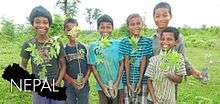
Eden's work in Nepal officially began in 2015 with just two nurseries. In the first year Eden staff planted over 350,000 trees. The devastating April 2015 Nepal earthquake hit at the beginning of planting season in Nepal, which was a major blow to the country. Thankfully though, planting efforts continued as planned. Eden has recently expanded to a total of nine seedling nurseries including one in Chitwan National Park which is a World Heritage Site. The project sites are primarily in the temperate and subtropical zones of the country, as the alpine zone is too cold and dry to support large scale reforestation. Eden continues to work in Nepal by planting native trees and agroforestry trees, which provides numerous families a secondary source of income. In 2018, after visiting Nepal's project sites, founder Steve Fitch commented on Nepal's progress, "In three short years, we have seen the most rapid tree growth in any of our nations, ever."
Highlights
- The Employ-to-Plant model Eden utilizes allows an individual tree to be planted for as little as 10 cents.
- Eden Reforestation Projects has planted over 200,000,000 trees across the five countries they work/worked with (Ethiopia, Madagascar, Haiti, Nepal, Indonesia).
- Eden also engages in holistic projects including: school construction, clean water projects, fuel efficient stoves, and the Sarobidy Birthing Center in Madagascar.
- Eden has partnered with Chitwan National Park in Nepal to help spread the reforestation message.
- In Madagascar, Eden works with two national parks the Ankarafanstika National Park and Baie De Baly national park.
Evaluations
As of May 2020 based on data from FY2018, Charity Navigator rates Eden as 3 out of 4 stars.[11] ImpactMatters rates Eden as a 5 out of 5 stars nonprofit based on data from 2017.[12]
See also
References
- "Deforestation | Threats | WWF". World Wildlife Fund. Retrieved 2018-12-17.
- Global Deforestation. (2010). University of Michigan. Retrieved from Archived 2011-06-15 at the Wayback Machine
- Naseem, S. (2011). No Trees...No Humans. Scitable Website. Retrieved from
- Lindsey, Rebecca. (2007). Tropical Deforestation. NASA Earth Observatory.
- Jones, T. G., et al. (2016). Madagascar's Mangroves: Quantifying Nation-Wide and Ecosystem Specific Dynamics, and Detailed Contemporary Mapping of Distinct Ecosystems. Remote Sensing, 8(106).
- Jones, T. G., et al. (2016). Madagascar's Mangroves: Quantifying Nation-Wide and Ecosystem Specific Dynamics, and Detailed Contemporary Mapping of Distinct Ecosystems. Remote Sensing, 8(106).
- "Local Nonprofit Eden Reforestation Projects Signs Major International Tree-Planting Deal". Glendora, CA Patch. 2017-05-10. Retrieved 2020-05-22.
- CIA World Factbook: Haiti. (2014)
- Shen, K. (2015). History of Haiti 1492-1805. Brown University, Department of African Studies.
- Environment and Climate Change Fact Sheet. (2015). United State Agency for International Development, Haiti.
- "Charity Navigator - Rating for Eden Reforestation Projects". Charity Navigator. May 1, 2020. Archived from the original on May 26, 2020. Retrieved May 31, 2020.
- "Eden Reforestation Projects - Impact Rating". ImpactMatters.org. November 22, 2019. Archived from the original on December 3, 2019. Retrieved May 31, 2020.
Further reading
- "Mangrove Project Progress". Archived from the original on 2015-02-26. Retrieved 2014-08-06.
- "Transformation in Ethiopian Regions". Archived from the original on 2016-03-03. Retrieved 2014-08-06.
- "Deforestation and Forest Degradation | Threats | WWF".
- Bashan, Yoav; Holguin, Gina (2002). "Plant growth-promoting bacteria: A potential tool for arid mangrove reforestation". Trees. 16 (2–3): 159–166. doi:10.1007/s00468-001-0152-4.
- Agroforestry and Sustainable Resource Conservation in Haiti
- Jones, Trevor; Glass, Leah; Gandhi, Samir; Ravaoarinorotsihoarana, Lalao; Carro, Aude; Benson, Lisa; Ratsimba, Harifidy; Giri, Chandra; Randriamanatena, Dannick; Cripps, Garth (2016). "Madagascar's Mangroves: Quantifying Nation-Wide and Ecosystem Specific Dynamics, and Detailed Contemporary Mapping of Distinct Ecosystems". Remote Sensing. 8 (2): 106. Bibcode:2016RemS....8..106J. doi:10.3390/rs8020106.